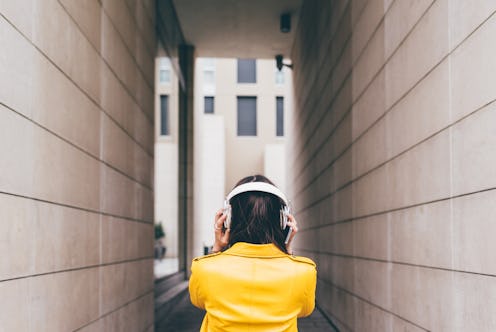Life
This Style Of Headphones Is The Least Bad For Your Hearing, According To Experts

It's pretty common knowledge that listening to music through headphones can cause damage to your hearing, just like any kind of exposure to loud noises. A study in 2010 found that 80 percent of teenage girls had experienced degree of hearing loss from listening to personal music devices through headphones. Of course, if you're concerned about the volume of your music doing damage to your hearing, you can always turn the volume down — but can a particular kind of headphone protect your hearing, or at least minimize this damage?
There's a huge variety of headphones and earbuds currently on the market, from tiny Bluetooth-enabled buds to massive noise-cancelling headphones. Whether you're into retro giant earphones or barely-there earbuds, though, you should take the concerns about how they might affect your hearing with a grain of salt: "Earbuds and listening to music with earbuds are not a major cause of hearing loss," ear specialist Dr. Robert A. Dobie told TIME in 2017. The American Speech-Hearing-Language Association notes that any sound is safe when played at a maximum of 70 decibels, or about the noise level of a vacuum cleaner. So, there doesn't appear to be any inherent value in one type of headphones over the other when it comes to hearing loss when you're playing music at a reasonable volume.
However, there is one area where the design of headphones does matter to your potential for hearing loss: how they deal with ambient noise. Noise-cancelling headphones, which are designed to block out the noise of the world around us through including "layers" of foam and material around the apparatus, may end up being better for preserving our overall hearing. Why? Because of our perception of noise levels. Headphones that just nestle in the eardrum without any kind of extra protection, Diana Michel writing for Audicus noted, "do not trap sound inside the space between the headphone speaker and the eardrum. This means that sound can easily escape, not allowing music to get too loud, damaging the ear." Sounds good for the hearing, right?
However, there's a problem with this. "Unfortunately,this also allows for more sounds to enter the ear, decreasing the effectiveness of the headphone," Michel wrote. "Wearers tend to overcompensate and increase the volume" of their music or podcast. The more your headphones block out external noise, the less likely you are to crank up the volume on what you're actually listening to — and, hopefully, the less damage you end up doing to your aural nerve endings.
But if you already have mild hearing loss, Kevin Taylor, the product technologist at Action On Hearing Loss, tells Bustle that the best choice isn't actually a noise-blocking headphone set. "The IQ buds are the latest innovation," he says. "These hearables sit comfortably in the ear, and in addition to streaming music, they help make near-by conversation clearer, which is ideal for noisy bars and cafes."
If you want to protect your hearing, then, it's better to invest in some hardware that lets you get clarity of sound — without cranking up the volume to block out the noise of the world around you.And it's important to use your headphones properly, too. Taylor tells Bustle, "Always start at a low volume and gradually increase to a comfortable level. Never listen to high volumes for long periods as this may damage your hearing further. And if you have concerns about your hearing, get your GP to check it out.”
In the future, music-related hearing loss may not be such a problem, as technicians are developing targeted sound technology that means ambient noise may be reduced or limited, and personal noises become more focused. But right now, if your hearing is OK, but you're concerned that you're not taking enough care of your ears, it's worth upgrading your headphones to something substantial — and noise blocking.